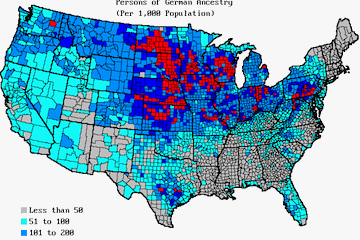5fish
Well-Known Member
- Joined
- Jul 28, 2019
- Messages
- 10,739
- Reaction score
- 4,570
In 1848, political revolution swept across Europe, the leaders of this movement were called "Forty-Eighters". The revolution of 1848 in Germany had early successes but it failed in the end. Many of the leaders of the German 1848 revolution after its failure left or fled to America, where they had an impact on our nation and our Civil war. Many of the names listed below will be recognized by many on this board.
The Forty-Eighters were Europeans who participated in or supported the revolutions of 1848 that swept Europe. In Germany, the Forty-Eighters favored unification of the country, a more democratic government, and guarantees of human rights.[1] Disappointed at the failure of the revolution to bring about the reform of the system of government in Germany or the Austro-Hungarian Empire and sometimes on the government's wanted list because of their involvement in the revolution, they gave up their old lives to try again abroad. Many emigrated to the United States, Canada, and Australia after the revolutions failed. They included Germans, Czechs, Hungarians, and others. Many were respected, wealthy, and well-educated; as such, they were not typical migrants. A large number went on to be very successful in their new countries.
Forty-Eighters in the USA
In the United States, many Forty-Eighters opposed nativism and slavery, in keeping with the liberal ideals that had led them to flee Germany. Several thousand enlisted in the Union Army, where they became prominent in the Civil War.
Many Forty-Eighters settled in the Texas Hill Country in the vicinity of Fredericksburg, and voted heavily against Texas's secession. In the Bellville area of Austin County, another destination for Forty-Eighters, the German precincts voted decisively against the secession ordinance. [2]
More than 30,000 Forty-Eighters settled in the Over-the-Rhine neighborhood of Cincinnati, Ohio. There they helped define the distinct German culture of the neighborhood, but in some cases also brought a rebellious nature with them from Germany. During violent protests in 1853 and 1854, Forty-Eighters were responsible for the murders of two law enforcement officers.[3]
After the Civil War, Forty-Eighters supported improved labor laws and working conditions. They also advanced the country's cultural and intellectual development in such fields as education, the arts, medicine, journalism, and business.
Famous German Forty-Eighters in the US
Why is it always the liberals that change the world for the better....
A thought to ponder...
The Forty-Eighters were Europeans who participated in or supported the revolutions of 1848 that swept Europe. In Germany, the Forty-Eighters favored unification of the country, a more democratic government, and guarantees of human rights.[1] Disappointed at the failure of the revolution to bring about the reform of the system of government in Germany or the Austro-Hungarian Empire and sometimes on the government's wanted list because of their involvement in the revolution, they gave up their old lives to try again abroad. Many emigrated to the United States, Canada, and Australia after the revolutions failed. They included Germans, Czechs, Hungarians, and others. Many were respected, wealthy, and well-educated; as such, they were not typical migrants. A large number went on to be very successful in their new countries.
Forty-Eighters in the USA
In the United States, many Forty-Eighters opposed nativism and slavery, in keeping with the liberal ideals that had led them to flee Germany. Several thousand enlisted in the Union Army, where they became prominent in the Civil War.
Many Forty-Eighters settled in the Texas Hill Country in the vicinity of Fredericksburg, and voted heavily against Texas's secession. In the Bellville area of Austin County, another destination for Forty-Eighters, the German precincts voted decisively against the secession ordinance. [2]
More than 30,000 Forty-Eighters settled in the Over-the-Rhine neighborhood of Cincinnati, Ohio. There they helped define the distinct German culture of the neighborhood, but in some cases also brought a rebellious nature with them from Germany. During violent protests in 1853 and 1854, Forty-Eighters were responsible for the murders of two law enforcement officers.[3]
After the Civil War, Forty-Eighters supported improved labor laws and working conditions. They also advanced the country's cultural and intellectual development in such fields as education, the arts, medicine, journalism, and business.
Famous German Forty-Eighters in the US
- Architects, Engineers: Adolf Cluss
- Artists: Friedrich Girsch; Wilhelm Heine; Louis Prang; Adelbert John Volck
- Generals in the American Civil War: Louis Blenker; August Kautz; Alexander Schimmelpfennig; Franz Sigel; August Willich
- Journalists, writers, publishers: Mathilde Franziska Anneke; Carl Adolph Douai, Carl Daenzer; Bernard Domschke; Christian Esselen; Karl Peter Heinzen; Rudolf Lexow; Reinhold Solger
- Musicians: Herman Trost, band leader in Sherman's army who later settled in Lexington, Kentucky, where he conducted the first band at the University of Kentucky. Friend of John Philip Sousa.
- Poets: Konrad Krez; Edmund Märklin; Rudolf Puchner
- Political activists: Lorenz Brentano (later a member of the Congress); Friedrich Hecker; Carl Schurz (later US Secretary of the Interior); Gustav von Struve; Wilhelm Weitling; Joseph Weydemeyer
- Other: Margaret Schurz, founder of the first kindergarten in the U.S.; Al Sieber, known as "Chief of the Scouts" in Arizona, who fought at Antietam, Fredericksburg, and Chancellorsville with Hecker, Schurz, and Sigel, and then in the Battle of Gettysburg; Joseph Spiegel, founder of the Spiegel Catalog; Hugo Wesendonck, founder of the Germania Life Insurance Company (now Guardian Life); Pauline Wunderlich (fought at the Dresden barricades)
Why is it always the liberals that change the world for the better....
A thought to ponder...
Last edited:

